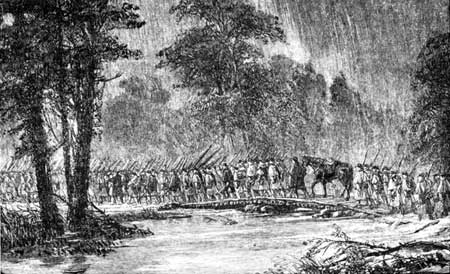|
RICHMOND National Battlefield Park |
 |
PART ONE
THE PENINSULA CAMPAIGN, SUMMER, 1862
(continued)

Sumner's troops crossing Grapevine Bridge to
reinforce Couch at Seven Pines.
From a contemporary sketch.
Up The Peninsula
After landing at Fortress Monroe the Federal troops pushed aside the thinly held Confederate defenses at Yorktown and Williamsburg and proceeded up the peninsula according to plan. But progress was slow. Every day 500 tons of forage and subsistence were required to keep the army in the field. Early in May it rained and kept raining, day after dreary day. Federal soldiers had a saying:
"Virginia used to be in the Union—now it's in the mud." Dirt roads turned into bottomless muck—creeks and gullies became swift flowing streams—fields were swamps. Roads and bridges had to be built and rebuilt, and still the thousands of wagons, horses, and mules continually stuck in the mud.
Realizing that an effective overland pursuit of the retreating Confederate forces under Gen. Joseph E. Johnston was out of the question because of the weather and the condition of the roads, McClellan on May 6 sent Gen. William B. Franklin's division up the York River by transport to West Point, terminus of the Richmond and York River Railroad, in an attempt to cut off the Confederate wagon train. Johnston anticipated the move, however, and on May 7 ordered Gen. W. H. C. Whiting's troops to attack Franklin in the battle of West Point, or Eltham's Landing.
The attack was repulsed, but, even so, the wagon train managed to continue safely to Richmond. McClellan, however, had cleared the way to his next objective—the landing at White House on the Pamunkey River, a tributary of the York. Here the railroad crossed the Pamunkey on its way to West Point. This would be the Union base of supply for the contemplated attack on Richmond. This battle also cleared the way for the right wing of the Union army, which would have to stay north and east of Richmond in order to hook up with McDowell's anticipated overland march from Washington.
General Johnston, falling back steadily in front of McClellan's slow advance, was the target of severe criticism from Richmond newspapers for not making a determined stand. But he wrote to Gen. Robert E. Lee: "We are engaged in a species of warfare at which we can never win. It is plain that Gen. McClellan will adhere to the system adopted by him last summer, and depend for success upon artillery and engineering. We can compete with him in neither."

|

|
|
Last Modified: Mon, Mar 4 2002 10:00:00 pm PDT |


